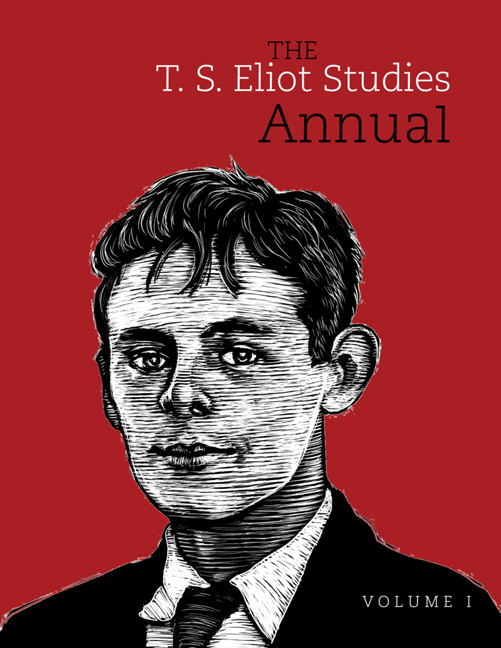Book contents
- Frontmatter
- Contents
- Abbreviations of Works
- General Editor's Note
- The Short and Surprisingly Private Life of King Bolo: Eliot's Bawdy Poems and Their Audiences
- Dull Tom-Tom's Absurd Prelude: Ludic Modernism in Early T. S. Eliot
- Eliot at Bergson's Lectures, 1910–1911
- The American Legacy of “Prufrock”
- Poetry (June 1915)
- The Stale Dregs of Revolt
- Prufrock, Belated
- Eliot's Allusive Legacy and Obscurity in “Prufrock”
- Transmuting F. H. Bradley: T. S. Eliot's Notes Towards a Theory of Poetry
- T. S. Eliot, Phenomenologist
- Astride the Dark Horse: T. S. Eliot and the Lloyds Bank Intelligence Department
- Aristophanic Structures in Sweeney Agonistes, “The Hollow Men,” and Murder in the Cathedral
- Eliot and Virgil in Love and War
- T. S. Eliot Bibliography 2014
- Notes on Contributors
Transmuting F. H. Bradley: T. S. Eliot's Notes Towards a Theory of Poetry
- Frontmatter
- Contents
- Abbreviations of Works
- General Editor's Note
- The Short and Surprisingly Private Life of King Bolo: Eliot's Bawdy Poems and Their Audiences
- Dull Tom-Tom's Absurd Prelude: Ludic Modernism in Early T. S. Eliot
- Eliot at Bergson's Lectures, 1910–1911
- The American Legacy of “Prufrock”
- Poetry (June 1915)
- The Stale Dregs of Revolt
- Prufrock, Belated
- Eliot's Allusive Legacy and Obscurity in “Prufrock”
- Transmuting F. H. Bradley: T. S. Eliot's Notes Towards a Theory of Poetry
- T. S. Eliot, Phenomenologist
- Astride the Dark Horse: T. S. Eliot and the Lloyds Bank Intelligence Department
- Aristophanic Structures in Sweeney Agonistes, “The Hollow Men,” and Murder in the Cathedral
- Eliot and Virgil in Love and War
- T. S. Eliot Bibliography 2014
- Notes on Contributors
Summary
In his notes to The Waste Land, Eliot famously glossed lines at the climax of the poem with a quotation from F. H. Bradley that ends, “In brief, regarded as an existence which appears in a soul, the whole world for each is peculiar and private to that soul.” For a number of critics, the Bradleian text serves as a hermeneutic key not only to the concerns of the poem, but also to Eliot's wider relationship with the philosopher—both having been seen as reflections on a struggle with solipsism. Nevertheless, the quotation itself is taken from an argument that Bradley reviews and ultimately rejects; Eliot's inclusion of a text that Bradley repudiates raises immediate questions about the relationship between the two figures. The fact that Eliot latched on to an argument that Bradley rejected suggests a degree of antagonism between the two writers. Eliot's allusion to Bradley in The Waste Land thus raises more questions than it answers.
The complicated relationship between literary and philosophical work was one of Eliot's great critical themes, informing his various and varied accounts of Dante, metaphysical poetry, and Shakespeare. It was an interest that doubtlessly had roots in the accidents and nature of his education, having been, at Harvard, an aspiring poet and philosopher and having studied under the Spanish philosopher George Santayana, author of Three Philosophical Poets (1910). In keeping with a category that Eliot himself outlined, the appearance of Bradley in The Waste Land might be seen as an example of a poet making poetic “use” of a philosophical idea whether or not he believes in it—a practice that Eliot saw exemplified in the work of Donne and Shakespeare.
While Eliot's interpretation of Bradley's philosophy—what Eliot took from Bradley and where disagreements between the two are to be found—has been a focal point for Eliot scholars, my own account uses archival sources to take a snapshot of Eliot reading Bradley. I draw on H. J. Jackson's account of the active, engaged, and often confrontational nature of reading as outlined in Marginalia: Readers Writing in Books (2001), and focus on aspects of Bradley's text that niggled at Eliot and encouraged the graduate student to counter the older man's positions in the margins of the printed text.
- Type
- Chapter
- Information
- The T. S. Eliot Studies Annual , pp. 99 - 113Publisher: Liverpool University PressPrint publication year: 2017



